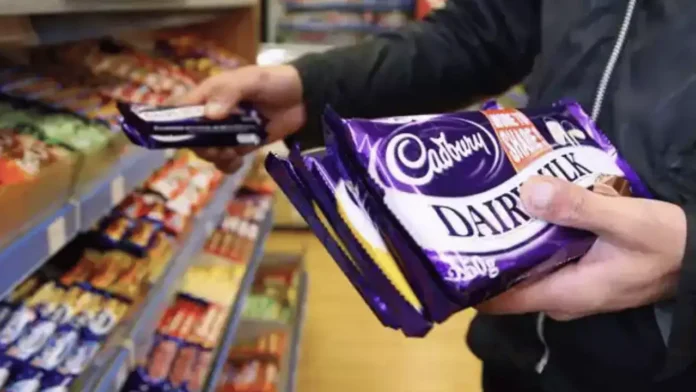Nestle, the producer of Quality Street, and Mondelez, the owner of Cadbury, are experiencing increased confectionery sales in the UK during this festive season. The uptick is driven by budget-conscious shoppers looking for more affordable gift options.
Analysts and consumer companies report that shoppers, grappling with inflation and increased mortgage rates, are opting for more budget-friendly gifts this year. Despite price hikes in the past year, executives note that some individuals are choosing chocolate over toys and gadgets, as it continues to be a relatively affordable option.
“Boxed chocolates have had a particularly strong start, with a year-on-year increase of 8.7% in value sales,” according to Fran McCargo, customer category manager lead for Nestle UK & Ireland, referring to the August-November period versus last year’s.
“Twistwrap chocolates have seen (sales) growth of 2.1%, to,” she said, adding that Nestle was seeing more shoppers buy chocolates as holiday gifts.
She mentioned that shoppers usually allocate less than 10 pounds ($13) for such items. Tins of Quality Street from Nestle, priced at 5 pounds each, and Cadbury selection boxes from Mondelez, priced at 1.50 pounds, are gaining popularity.
On the flip side, data from Circana, formerly known as NPD, indicates that the average selling price of a toy in Europe is approximately 13 pounds. Earlier this month, multiple toy manufacturers informed Reuters that there is a decrease in demand for toys this year.
“The deals with chocolates have been quite reasonable, it’s not gone any higher (in price) – gifts and toys and other stuff, yes, but chocolates no,” said Bonnie Johnson, a 42-year-old care home worker.
“It’s a cheaper gift to be able to give to quite a lot of people,” Johnson added.
Sainsbury’s and Tesco are providing discounts on Quality Street and Celebrations for customers holding loyalty cards.
Additional Nestle brands that commonly experience high sales during the holiday season include KitKat Santa, priced slightly above 1 pound, and Milkybar Festive Friends, available at 1.25 pounds.
To counter the effects of cocoa prices reaching a 46-year high this year, manufacturers are introducing a range of “premium” chocolate products that can be sold at elevated prices.
“It will help fourth-quarter earnings, as the Christmas period is the strongest for chocolate companies,” said Vontobel analyst Jean-Philippe Bertschy.
Nestle has indicated that its underlying trading operating profit margin for this year is expected to range between 17% and 17.5%, a slight increase from the 17.1% recorded in 2022.
As per its latest annual report, the confectionery segment of the company contributes approximately 8.1 billion Swiss Francs ($9 billion) in annual revenue, accounting for a portion of the total group sales of 94.4 billion Swiss Francs recorded last year.
Euromonitor International estimates the global chocolate market’s value at $123.5 billion, with the holiday season being the most active period of the year.
Susan Nash, the Trade Communications Manager at Mondelēz, mentioned that more affordable indulgences are notably favored among younger adults.
A survey by McKinsey indicates that during this holiday season, 90% of British Gen Z shoppers and 83% of Millennial shoppers are inclined to “trade down” to more affordable products. In general, 74% of respondents expressed their intention to purchase less expensive gifts.
Evie Byrne, a 29-year-old doctor, mentioned that she and her friends have reduced their “Secret Santa” gift exchange budget to 10 pounds this year, down from 20 pounds last year.
“I guess we are down-scaling things slightly, without realising it,” Byrne said while shopping at a Morrisons supermarket in Camberwell, southeast London.
Contributing to the festive spirit in Britain, the act of gifting high-end chocolate tins has become a tradition, as revealed by data from Circana. The domestic market for chocolate gifts is estimated to be valued at approximately 1.8 billion pounds, experiencing a 7% growth in the past year, largely propelled by increased prices.
According to data from Circana, the British toy market, valued at around 2 billion pounds, has seen a decline of nearly 4% this year.
Following the holiday season, chocolate manufacturers anticipate encountering more challenging trading conditions next year while dealing with the impact of escalating cocoa costs. Nevertheless, executives note that chocolate tends to exhibit greater resilience compared to other non-essential purchases.
“In difficult periods, consumers tend to reassess their non-essential expenses. Nonetheless, they are less inclined to cut back on their expenditure on confectionery gifts,” remarked Nash.





